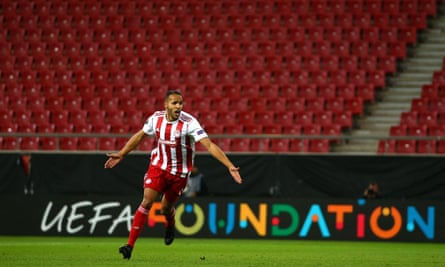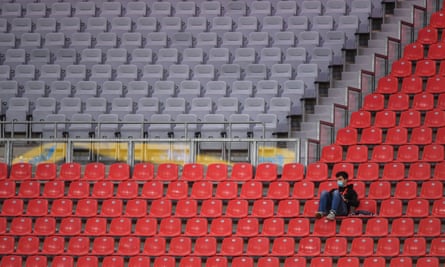[ad_1]
ven during the current hiatus, Peter Drury is still spending time at a football ground. “I have just finished wiping my final tray and my final table,” says Drury. “I do two days a week at Watford’s ground, which is my local club. They have given over the hospitality boxes in the Graham Taylor stand to the doctors and the nurses who work at the hospital that is bang next door to Vicarage Road. So the club provides breakfast, lunch and somewhere to chill out and I go in to wipe tables and trays, clean away plates, knives and forks and ketchup.”
Drury’s voluntary work for the NHS at Vicarage Road gives him a connection to the game he has been commentating on since his days at BBC Radio Leeds in the early 1990s. “All of us who play our little part in the football industry need to just make sure we are looking at our humility compass when we return,” he says.
Guy Mowbray’s broadcasting career began in a similar fashion. He started at BBC Radio York a few years after Drury before working his way up to becoming the main commentator for Match of the Day. The shutdown came in a rush for Mowbray. “It all happened in one day for me,” Mowbray says. “The previous weekend I did the Liverpool-Bournemouth game on the Saturday, went to see a musical that night with my wife and daughter, followed by the Manchester derby at Old Trafford the next day. I remember thinking: ‘Hang on a minute, it’s highly probable I am going to get this thing – I have been to Anfield, a packed, warm theatre and now am at Old Trafford.”
Mowbray and Drury both commentated on the Olympiakos v Wolves match in the Europa League on 12 March, their last action before the shutdown. “I was driving home and heard about Mikel Arteta,” says Mowbray. “I was supposed to be doing Brighton against Arsenal on the Saturday but quickly deduced: this match definitely isn’t going to be happening because the manager can’t go. By morning, everything was off.”

Drury had been looking forward to a glut of games. “I had to get ahead of myself in terms of homework,” he says. “On my desk I still have a complete set of notes ready for Watford v Leicester, which was the lunchtime game on the Saturday, a near complete set of notes for West Ham v Wolves on the Sunday, and a 50% set of notes for the Merseyside derby on the Monday. I had three in a row and then Juventus v Lyon the following Tuesday, then the second leg of Wolves v Olympiakos. It was a really crazy week.”
Drury has been surprised by how quickly he has adjusted to life without football. “We live off the buzz of the matches, but I very quickly came around to the gentler lifestyle. I have really cherished the last few months. Two of my three grown-up sons are back in the nest, so I have got my pals to play with again. I have been cooking, reading books I wouldn’t normally read, and running distances I wouldn’t normally run. And I’m a Joe Wicks advocate, so I dance around to him every morning.”
The enforced break gave both commentators a change to recharge their batteries. “It was the break my body needed,” says Mowbray. “I didn’t want a break, but I slept really well for a couple of weeks. I have a problem with rosacea on my skin and that has all cleared up over the last six weeks, so I have crystal clear skin for the first time in years. The stress level has obviously gone down.”
After catching up on a few jobs around the house, Mowbray started preparing for a tournament that will take place next year. “We quickly found out that the European Championship was going to be cancelled,” he says. “I have prepped for it over the past few weeks, doing all the stuff I can do at this point. Obviously there is going to be a season’s worth of updating to do, but a lot of information won’t change. I’ve got the skeleton done for all the games I was going to do at the Euros.”
Drury adopts a completely different approach. “I always say that every match you broadcast is like revising for a GCSE: you learn it, you mug it up, then you spit it all out in an hour and a half, and actually you have forgotten it by the next day and move on to the next one. It doesn’t play into my short-termism – so much has to happen that I can’t really get to it – but I understand why Guy has done it.”
Football will return slowly, with commentators working from a studio or even their own homes. Both have been in full admiration of Paul Dempsey, who has been commentating from home on Bundesliga games for BT Sport in recent weeks. It will be different, but Drury and Mowbray both have plenty of experience of commentating from afar. “I’m very accustomed to it because I started my television broadcasting career at Eurosport, so I did that a heck of a lot,” says Mowbray.
“Twenty-odd years ago I did a lot more that way than actually in the stadiums. It’s not something you like. It’s not as easy. There’s a lot more being vague. In a way it sharpens you up because you’re extremely conscious, as you always should be, that you’re only seeing exactly what the viewer is seeing. Sometimes when you’re in the stadium you might start talking about something that is not on your monitor – you shouldn’t do it really, but it catches your eye.”

Drury will make his return this weekend, commentary on BT Sport for Wolfsburg v Eintracht Frankfurt, a game played in an empty stadium. “We surf the noise of the crowd,” he says. “And to be shouting and screaming when someone scores a goal and to realise that nobody else is shouting and screaming, it will sound ridiculous. That is going to be a challenge. Being at the game and doing it ‘properly’ is commentating. Sitting in a studio and doing it in those sterile circumstances, it’s pretending to commentate. That’s not to denigrate what happened with the Bundesliga because that became a necessity and Paul Dempsey did a terrific job.”
Working in isolation also affects the interplay they have with co-commentators. “Generally we say what, they say why,” Mowbray says. “There will be times when I have to cut across my co-commentator because there’s suddenly a counter-attack, for example. They have to be a little more nuanced and subtle about when to come in. It’s inevitable that there’s going to be some crossover, but it’s a conversation, which you at home are involved with, so I’m happy with that.”
Even when they are allowed back into stadiums, that chemistry between two colleagues working side-by-side will be strained as the two-metre rule will be in place. “That is going to be very interesting,” says Drury. “Sitting in a stadium a few yards apart shouldn’t be such an acute problem, but nevertheless those little nudges and winks, the unseen body language which you start to understand, certainly with a regular commentary partner such as Jim Beglin, that will be missing.”
Neither of them has any concerns for their personal safety when they return. “I’ve got no qualms whatsoever about doing it,” Mowbray says. “I would do a game this afternoon if I was asked to. I would have complete faith that all possible precautions had been taken, so I don’t have any issue with it.” Drury agrees: “I don’t feel nervous at all. I hope that’s not over-confident. I’ll be in the stadium but I won’t be allowed anywhere near the players. From a broadcasting point of view, I think we are the least of the problems when it comes to restarting.”
Mowbray has thoroughly enjoyed the chance to look back through the BBC Rewind series, which replays FA Cup and World Cup games, but he is concerned about clubs further down the football pyramid. “My club, York City, were sitting top of the National League North. We still don’t know what is happening. I’m just grateful that – fingers crossed, touching wood – we will still have a club next season as, at that level, that should be the only burning issue.”
Drury this will be a period of reflection for the game. “I really hope we use it as a cleansing period – because it could be bloody for football, especially in the lower leagues. Despite the heavy losses it might very well incur, I just hope it has the togetherness to relaunch itself in the right way at all levels, so that it finds its place in society somehow more appropriately and looks after its own and it understands its own history. It realises that Accrington Stanley are just as important as Manchester United in their own way.”
Mowbray and Drury are united in their fears for smaller clubs and hopes that clubs will be more aware of their responsibility to their communities. In a small way, Drury’s work at Vicarage Road feeding NHS staff is a shining example of how football should respond in the future.
Richard Foster’s new book Premier League Nuggets is out now and you can follow him on Twitter.
[ad_2]
Source link